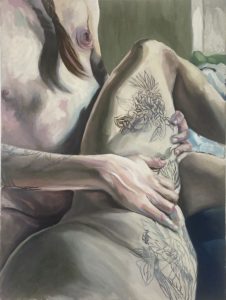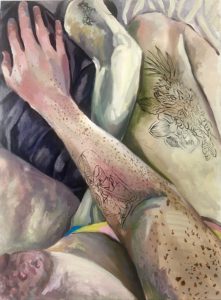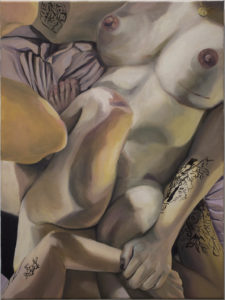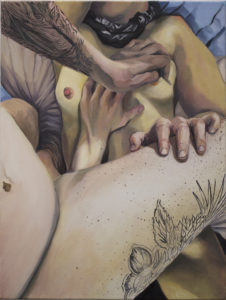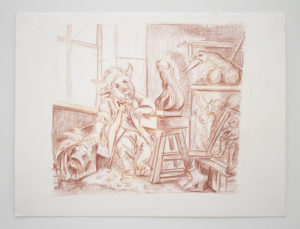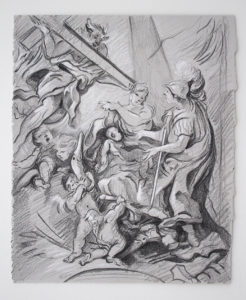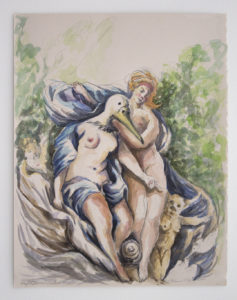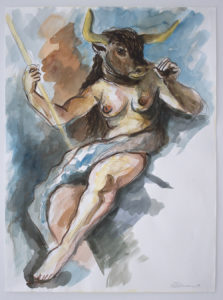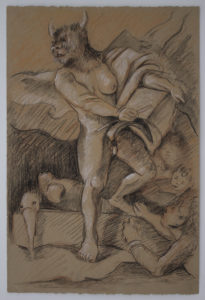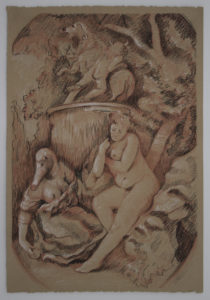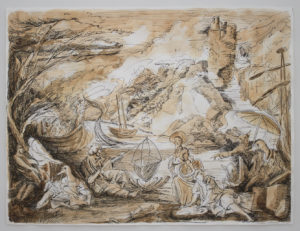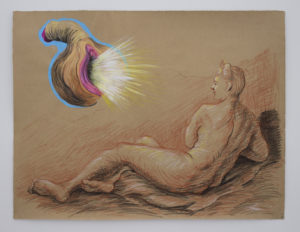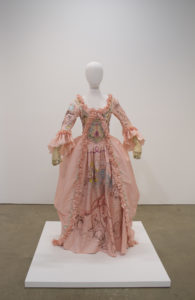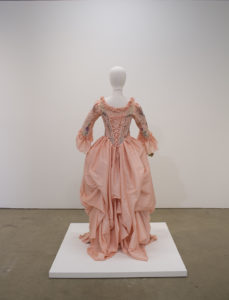August 19, 2024—October 19, 2024 | Reception, Saturday September 7th, 4-6PM
James Harris Gallery is pleased to present our first solo exhibition with artist Molly Vaughan. Vaughan is a multi-disciplinary artist who works in performance, sculpture, and painting to address the representation of transgender individuals as well as those who do not fall into the binary gender spectrum. Her work is an investigation of the fluidity of gender and asks the viewer to see the positivity of transgender and gender diverse bodies when binary systems are questioned and deconstructed.
The show will consist of two bodies of work. In the front main gallery, we will present a selection of drawings along with a sculpture inspired by the late Baroque style of Rococo associated with the French artist Francois Boucher (1703-1770). Decadently frivolous and overtly sentimental, Rococo portrayed classical themes emphasized through female eroticism. Since 2006, Vaughan has been intent on unpacking the relationship between Rococo and femininity; signifiers of femaleness and the social constructs surrounding it. By depicting transgender figures and inserting them into Boucher’s highly sexualized scenes, new meanings and visual histories are created. In the work “After Boucher: The Other as Aeolus” Vaughan has depicted a minotaur, a mythological figure with a head and tail of a bull and a body of a man, with breasts bringing to fore the fallacies of inherent maleness. Vaughan asks viewers to consider the trans body as natural a feature in the Rococo as any of the mythological beings existing next to both ordinary and regal individuals. Though trans people are not mythological creatures, Vaughan brings to light that it takes herculean inner strength and belief to accept one’s true authentic self. Accompanying the drawings is a sculpture of a 18th century dress complete with paniers. Based on dresses from the Rococo period, the sculpture is adorned with hand painted animals, minotaurs, flowers, female figures, genitalia, as well as other gendered symbols links its historical form directly to the artist’s world. Even the gendering of the pink silk fabric can be seen as gesture or an assertion of female agency. Works in the series “After Boucher” embrace the sensory but underneath lies deep questions regarding gender diversity and its historical precedent.
Vaughan’s most current series of work is on view in our second gallery. Four oil paintings depict figures in intimate acts; the artist uses diagonals, foreshortening, and cropping to imbue the works with the power of human connection. The compositions of these works are generated from photographs. Similar in intent to the series “After Boucher”, these works take aim at the Post War strategies of male dominated figurative painters who often added to the canon of objectifying women bodies. Using photography as a mirror, the artist creates paintings of personal moments depicting her interlocking body with other trans lovers. Heads are purposely left out not to remove identity but to emphasize the universality of love. Vaughan sees painting as an instrument of joy while confronting the societal norms of entwined bodies. The four works on display are concerned with this issue but just as important is the creative process; how color and form work together and imbues each composition with gesture and nuance. This series is titled “T4T Intimacy” reflects on the artist’s desire to empower people to look at themselves internally as wells as externally. The work exists to maintain its identity and through that its power to address gendered views of the comingling human touch.
Lastly, at 7PM on Friday September 6th, Vaughan will perform “Atonement for Imaginary Sins” which debuted at the Alabama Center for Contemporary Art last year. This performance incorporates direct actions of defiance against anti-LGBTQIA2S+ legislation through the use of traditional flagellation techniques. Since January of 2023, more than 1,000 bills have been proposed in the USA against LGBTQIA2S+ community, the majority of which are directed at the trans community, particularly in the areas of health care, education, and important civil rights. Using a flogger created from the symbolic elements of the American flag, the artist flogs herself one time for each bill pushed forward in the country since the beginning of 2023. Vaughan’s act of self-flagellation makes visible the emotional pain that the seemingly endless attack on the trans community generates. With each blow, the artist fortifies herself against this hate, and asserts her ability to hold firm against those who wish her harm. Traditionally, flagellation is an act of atonement for sin, but these bills accuse the artist and her community of sins they have never committed. They are imagined and wielded against trans people who have long been social and political pawns. By taking the flogger in her own hand and striking her own body, Vaughan is denying her tormentors the privilege and satisfaction of physical harm.
Molly Vaughan
Molly Vaughan is a multi-disciplinary artist who works in performance, sculpture, and painting to address the representation of transgender individuals as well as those who do not fall into the binary gender spectrum. Her work is an investigation of the fluidity of gender and asks the viewer to see the positivity of transgender and gender diverse bodies when binary systems are questioned and deconstructed.
Oil on linen
24" x 18"
Oil pencil on paper
12” x 16”
Inquire about this work
Litho Crayon and White Chalk on Paper
15" x 12"
Inquire about this work
Watercolor on paper
14" x 11"
Inquire about this work
Watercolor and Lithographic Crayon on paper
23 7/8” x 17 ½”
Inquire about this work
Conté and White Chalk on paper
22 1/8" x 15"
Inquire about this work
Conté on paper
22 1/8" x 15"
Inquire about this work
Watercolor and Ink on Paper
17 7/8” x 23 7/8”
Inquire about this work
Pastel and Gouache on Paper
19” x 24 ¾”
Inquire about this work
Conté, acrylic, and marker on sateen
68" x 30" x 29"
Inquire about this work
Conté, acrylic, and marker on sateen
68" x 30" x 29"
Inquire about this work

